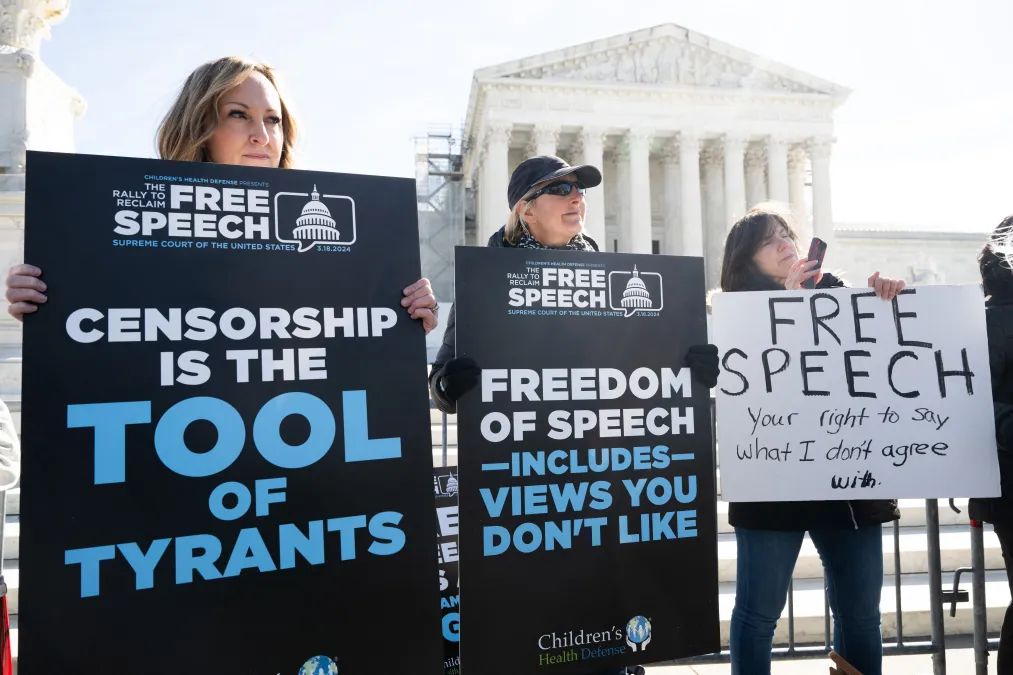Defining coercion at heart of Supreme Court case on government jawboning platforms

In oral arguments Monday before the Supreme Court in a case that has curtailed the ability of U.S. government officials to communicate with social media companies about the presence of disinformation on their platforms, justices appeared eager to discern when communication between the federal government and companies crosses the line and becomes coercion.
Both conservative and liberal justices questioned whether there are no circumstances in which the government can’t communicate with third parties about taking down online content without overstepping constitutional grounds.
Two states and five individuals brought the case in question — Murthy v. Missouri — arguing that government coordination with social media companies around vaccine misinformation and election fraud represents an unconstitutional breach of the First Amendment.
In a ruling that has reverberated from Washington to Silicon Valley, a lower court agreed with the plaintiffs, and decreeing that U.S. government officials trampled on free speech rights in encouraging social media platforms to remove content that questions the effectiveness of vaccines or the integrity of elections.
In oral arguments Monday, U.S. Deputy Solicitor General Brian Fletcher argued lower courts had failed to understand the “fundamental distinction between persuasion and coercion.”
While government officials often communicate with social media companies about mis- and disinformation posted online — and at times urged them to remove or block such content — Fletcher argued that these exchanges lacked the threats of retaliation that would qualify as coercion.
“The government may not use coercive threats to suppress speech, but it is entitled to speak for itself, by informing, persuading, or criticizing speakers,” he told the court.
Indeed, the platforms frequently denied government requests to take down posts or remove content, demonstrating that social media companies did not feel undue pressure to censor on the government’s behalf, Fletcher argued.
Several justices appeared skeptical during Monday’s oral arguments that the state had violated free speech rights in communicating with platforms.
Justice Elena Kagan pressed Louisiana Solicitor General Benjamin Aguiñaga, who argued on behalf of the plaintiffs, why a ruling in his favor wouldn’t also sweep up routine exchanges that take place between the government and third parties, such as when an agency communications official calls up a newspaper to complain about a story with factual errors or to argue that an unfavorable op-ed was unfair.
“It seems like an extremely expansive argument, I must say,” Kagan mused. “This happens literally thousands of times a day in the federal government.”
Other members of the court sharply disagreed with that comparison. Justice Samuel Alito claimed the persistent “pestering” of social media companies, along with the government’s antitrust and regulatory authorities, effectively amounted to the government treating Facebook, Twitter and other platforms “like their subordinates.”
He wondered whether the government would use a similar tone when communicating with media outlets or insist that they are partners with the government. “Constant meetings, constant emails. ‘We want answers, we’re partners, we’re on the same team.’ Do you think the print media regards itself as being on the same team as the federal government?” Alito asked.
Monday’s arguments come as part of a landmark case in the evolving relationship between the government and online platforms and the ability of the former to limit the flow of false information on the latter. In recent years, the government has stepped up its information-sharing efforts with technology companies both for public health purposes but also for matters of national security, such as alerting platforms about how their tools are used by foreign states to spread propaganda.
While justices appeared broadly skeptical of the plaintiff’s argument that the government had overstepped in policing speech online, it was not clear whether a clear majority of the justices would seek to preserve their ability to flag problematic speech to online platforms.
“It seemed that many justices were concerned about some of the conduct of the federal government in this case and that it may have crossed a constitutional line, but they seemed equally wary of issuing a broad ruling that could impede routine communications between the government and social media companies,” said Kate Ruane, director of the Free Expression Project at the Center for Democracy and Technology, a left-leaning Washington think tank.
In Monday’s arguments, justices probed when communication might cross the line to become coercion and how the government’s other regulatory powers might influence the perception of when communication is coercive.
Justice Neal Gorsuch wondered whether intimating that the government would be more or less willing to use its antitrust or regulatory powers against an entity if it didn’t receive cooperation would count as coercion. Chief Justice John Roberts asked whether smaller actions, like moving the desk of a newsperson to a worse position after unfavorable coverage, would be considered a form of coercion.
Some justices balked at the absolutism of the plaintiff’s position. Justice Ketanji Brown Jackson asked if there were any circumstances — such as a hypothetical viral trend online encouraging kids to jump out of windows at ever greater heights that led to actual harm — that would provide the government with a constitutional rationale to lobby social media companies to remove harmful posts.
Aguiñaga said no. “The moment that the government tries to use its ability as the government and its stature as the government to pressure them to take it down, that is when you’re interfering with third-party speech rights,” he told the court.
If the lower court ruling is upheld, it would have major consequences for the government’s ability to share information with platforms, and government officials argue these effects are already being felt.
The lower court ruling by the Fifth Circuit Court of Appeals (since partially lifted by the Supreme Court while it hears the case) barred the government from not just coercing or but also “significantly encouraging” social media companies to take action on controversial posts. And according to Fletcher, this injunction is “hanging over the heads” of federal officials and is impeding routine work to combat disinformation, including from overseas.
Last month on Super Tuesday — when millions of Americans voted in primary nominating contests — a CISA official told CyberScoop and other reporters that the agency has not had any contact with social media companies as part of their election security mission.
A week earlier, Sen. Mark Warner, D-Va., said that in the wake of the ruling CISA, the NSA, the Office of the Director of National Intelligence and the FBI have “literally had no communication” with social media companies on election interference since July 2023. “And that ought to scare the hell out of all of us,” Warner added.






